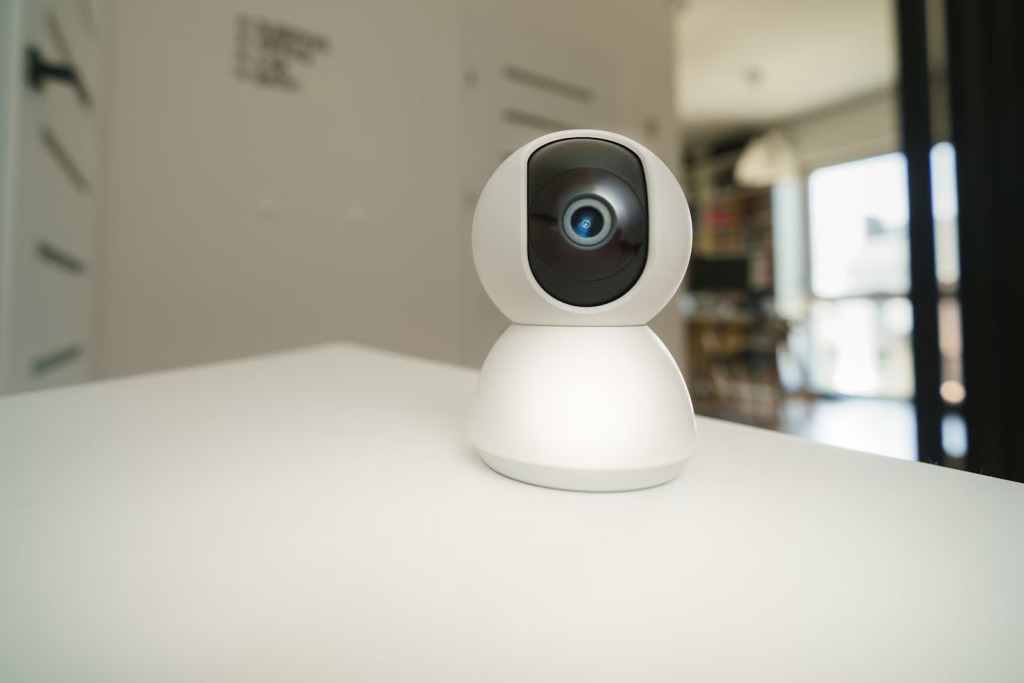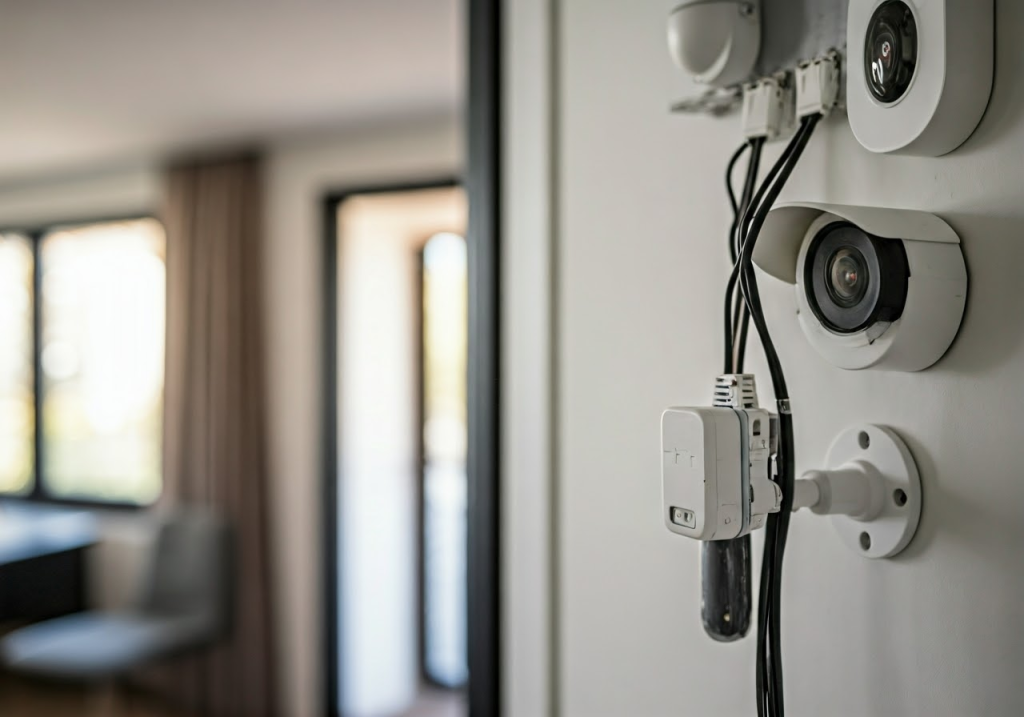
Key Highlights
- Wired and wireless security systems protect your home in different ways
- Wired systems are very strong but require professional installation
- Wireless systems are flexible and easy to set up, making them great for DIY fans.
- Many modern systems have smart home features, adding more convenience and control
- Think about what you need, your budget, and how comfortable you feel with technology when you choose.
________________________________________
In today’s world, technology is changing quickly. This change makes it very important to keep our homes safe. Home security has advanced from old methods. Now, we have smart home security systems. Many of these systems come with professional monitoring, which gives great peace of mind. When choosing home security, it is important to know the difference between wired and wireless systems. This knowledge helps you pick what is best for protecting your family and your belongings.
Understanding Wired Security Systems

Wired security systems are important for keeping homes safe. They are dependable and have strong connections. These systems use sensors, detectors, and cameras. All these devices connect directly to a control panel with wires. This setup provides a steady way to communicate. It also reduces the chance of signal problems.
These systems need to be wired, so they often require professional installation. This involves drilling holes and running cables through your home. It may seem like extra effort, but it ensures that the system is safe and looks nice. It blends well with your home’s design.
The Architecture of Wired Security Systems
A wired security system uses a control panel as its main command center. This panel receives signals from various security devices set up in your home. For example, sensors on doors and windows detect if someone attempts to enter. Motion detectors notice any strange movement near them.
These security devices connect with wires. This system sends real-time updates to the control panel or base station. If an alarm sounds, the panel quickly turns on alarms and lights to frighten intruders away. It also notifies you and the monitoring center.
Since the control panel and security devices are wire-linked, the chances of losing signals and/or signal interference are minimal. Hence, It is more reliable. Bigger homes or spaces that will benefit from a solid and uninterrupted signal are served well by wired systems.
Advantages and Disadvantages of Wired Solutions
There are advantages to choosing a wired security system. First, connection by wire will reduce the chances of losing signal, getting interference, or being hacked. This also increases the system’s reliability. Second, installation by professionals ensures that there is tidiness to the look and feel of the installation. It relegates the wires and puts the sensors where they belong.
Problems with Wired Systems
The problem is that you need professional installation. The upfront cost can be higher. Drilling holes and running wires throughout your home may also be necessary.
Here’s a quick look at the pros and cons:
Pros
- It is more reliable when hardwired.
- Professional installation hides the cables and makes the setup look better.
- The design is safe and cannot be tampered with.
Cons
- There is a higher starting cost since you will need professional installation.
- It has less freedom in that you can choose where to put the devices and add more later.
- During the wiring, there may be some disruptions.
Delving into Wireless Security Systems

One of the greatest advantages of wireless security systems is flexibility. You don’t need wires to place sensors, cameras, and other smart devices exactly where you need them. This helps you get better coverage and safety. If your security needs change, you can expand your system with additional devices.
Smart home devices have no problems with wireless systems. You can connect your smart home hub with your security system. It allows you to control it through your voice with Google Assistant or Amazon Alexa. It will also arm itself when you leave and disarm when you come back home.
Wireless systems make it easy to view your home from wherever you are with your smartphone or tablet. You can also receive alerts, watch live video camera feeds, and more. You also have the chance to control your system from any place where there is internet. This lets you know what’s going on and what you can do about it no matter where you are.
Addressing Common Concerns: Reliability and Interference
Using wireless security systems is easy. But of course, there are still those who fret over their reliability and potential interference. However, new technology has solved these issues. Today’s wireless systems take encryption seriously, with strong encryption keeping things safe between the devices and the main hub.
They also have ways to remain connected with the monitoring center. These systems have battery backups to supply power during outages. Cellular backups mean you can communicate if your internet crashes. Monitoring continues, and the emergency response remains quick.
We must also remember that while wireless systems are great, they can still be affected by interference. The signal can be disrupted by nearby electronic devices, obstacles in your home, and weak Wi-Fi signals. However, if you place your devices in the right spots, have a good signal, and find a system that suits you, you can alleviate these problems.
How to Select Security Systems: Key Considerations
Before choosing a security system, you need to define what you need. Consider the size and layout of your home. Do you want to guard the outside, watch the inside, or do both? You’ll also want to check for weak spots such as doors or windows that are easily reached. Imagine if you have panic and want help from customer service.
Added safety is provided by professional monitoring services. There are experts available 24/7 to assist you. That means if the alarm sounds, they can respond quickly to offer assistance. Some people are fine with self-monitoring. They depend on alerts from their smartphones and act as necessary.
Moreover, consider what you want to do with home automation. Do you want to connect your security system with other smart home devices like lights, thermostats, or smart locks? Pick a system that suits your simple control and automation needs.
Smart Home Device Compatibility
Today, it’s still important to link your security system to your smart home. Compare the system with popular smart home configurations such as Google Assistant and Amazon Alexa.
With Google Assistant, you can arm your security system simply by saying ‘Let’s go’ or ‘OK Google, arm security.’ You can also get alerts on your smart display when it detects motion. If your security system is compatible with smart lighting, you can configure the lights to come on during a break-in. This provides a visual warning and alerts you when something happens. It also lets you maximize cloud video storage for oversight.
Personally, I think the number one reason to have a smart home is that it helps you with daily tasks and makes you safer. It often comes down to a good security system. It will link your other devices together and make it easier to manage your home.
________________________________________
When deciding between a wired and wireless security system, consider their reliability, ease of installation, and flexibility. Wireless systems are flexible, while wired systems are strong.
Regular maintenance and upgrades are key, whether you choose wired or wireless. This ensures your security system works well. Frontline Electrical experts are always ready to help you choose the right security system for your home if needed.
Frequently Asked Questions
What’s the difference between wired and wireless security systems?
Wired security systems rely on physical cables to connect devices, offering more reliability and less signal interference. Wireless security systems, on the other hand, use Wi-Fi or radio signals, allowing for flexible installation and smart home integration.
Are wireless security systems reliable?
Yes, modern wireless security systems are very reliable. They use encrypted signals, battery backups, and even cellular failovers to ensure continued operation during power outages or internet issues.
Do I need professional installation for security systems?
It depends. Wired security systems usually require professional installation due to drilling and cable routing. Wireless security systems are designed for easy DIY setup, making them ideal for renters or those who prefer flexibility.
Can I control security systems with my smartphone or voice assistant?
Absolutely. Many security systems today integrate with smart home platforms like Google Assistant and Amazon Alexa, allowing voice control, remote monitoring, and real-time alerts through smartphones or tablets.
Which security systems are better for large homes?
Wired security systems are generally better for larger homes because they provide a strong, uninterrupted signal. They are less prone to interference and often more dependable for covering wide areas.


